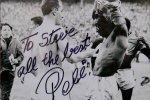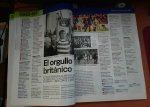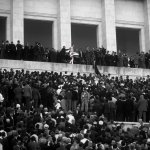Shared from CQN
KELVINBHOY on
29TH APRIL 2019 10:27 PM
Its a long read but worth it. Super insight from Matthew Syed in The Times on Stevie Chalmers.
“When I think of Stevie Chalmers, I don’t just think of a fine footballer. I don’t just think of a remarkable man who overcame a bout of tuberculosis meningitis as a 20-year-old, spending six months in hospital and coming close to death, before signing for Celtic two years later.
I don’t just think of how much has changed in the game since those days, a time when players like Chalmers earned a few quid a week, lived in single-enders, and whose wives experienced little of the glamour associated with being a wag. “We had none of that,” Sadie, his wife, told me. “Our first home was a tenement in Denniston . . . We had one room that served as a bedroom, kitchen and living room, and the toilet was outside on the landing.”
The Celtic side that Chalmers thrived in had a keen sense of community, nurtured by Stein
Instead, I think about the concept of “community”. That was the word that seemed to reverberate through our conversation when I first got to know the great-uncle of my wife, Kathy. One of his first memories was hunkering down with his fellow Glaswegians in a shelter during World War Two, and when he started playing football, the game was defined by solidarity between teammates, and between players and fans.
Chalmers would win his highest fame by scoring the winning goal in the 1967 European Cup final, helping Celtic to become the first British team to win that special honour. But it was the make-up of that squad that remains so vivid: 15 players, each born and raised within 30 miles of Celtic Park, coached by a fellow Scot in Jock Stein who was not only an innovator in tactics, but had the wisdom to nurture a sense of community.
When you read the memoirs of Sir Alex Ferguson, you gain an insight into how social solidarity emerged from the dense tenements of Scottish industrialisation. The former boss of Manchester United has long argued that one of his strengths as a manager was tying the human instinct for connection to the beautiful game. “That’s team spirit,” he would say to new players, “when you give your life to someone. No one at the club ever wins a thing without the other ones.”
The Celtic side that triumphed in the European Cup had this spirit. They were not just a group of players who shared the same employer. They were not just united in receiving a pay cheque from the same institution. No, they were Celtic. Their identity was bound up with the club, with the city, and with each other. “There was an incredible togetherness,” Chalmers once told me. “Stein was a coach with a brilliant tactical brain, who changed things around a lot . . . But he realised that one of our biggest strengths was our unity, which he nurtured.”
“It wasn’t just the players who were close to each other, but also the families,” Sadie said when I interviewed her in 2017. “John Clark, Billy McNeill and Jimmy Johnstone used to get a lift every day into training from Jock Stein, who would meet them in his car at the bus stop. Stevie always used to room with Bobby Murdoch when they went away. You could have the team in a room with 500 people at a club function and, within minutes, they would be sitting together as a group, sharing stories. It is like a family more than a football club.”
Chalmers was a modest man, but he could occasionally be tempted to share his memories of the final of 1967, a night when Celtic shocked Inter, a team coached by the fabled Helenio Herrera, and masters in the catenaccio. Stein’s stroke of genius was to negate the man-marking of the Italians by instructing his players to run into unusual positions, freeing up space for the full backs to charge forward. As Chalmers put it in his autobiography: “With Willie Wallace and Bobby Lennox making similar runs and with our full backs overlapping frequently, it is easy to see how the Italians’ finely tailored marking system was rapidly coming apart at the seams.”
Chalmers continued to play in Celtic green and white for four years after that unforgettable night, before leaving the club, and ultimately working in the pools and hospitality departments. He remained physically fit (and very handsome) into his eighth decade, a single-figure handicapper in golf, a game he came to love.
It wasn’t until his mid-seventies that the family noticed the first signs of dementia, possibly caused by the heavy footballs used in his day, and his deterioration was both swift and cruel. When Rita, my mother in law, posted on the family WhatsApp group last week that Stevie was critically ill, the family braced itself. The last few years have been particularly tough for Sadie, who has cared for the man she loved, but who has had to witness the slow seeping away of memory and identity.
Chalmers will always be remembered as the man who scored that most celebrated of goals, but also as a wonderful father, husband, uncle and friend. In that interview in 2017, Sadie said: “I regularly sit down with Stevie and we look at photo albums of his grandchildren, and black and white shots of him playing in his Celtic strip. “Every now and again, there is a flicker of recognition. ‘That is me, isn’t it?’ he will say. ‘Yes, that’s you, darling,’ I reply. ‘You were a wonderful, wonderful player.’ ”



